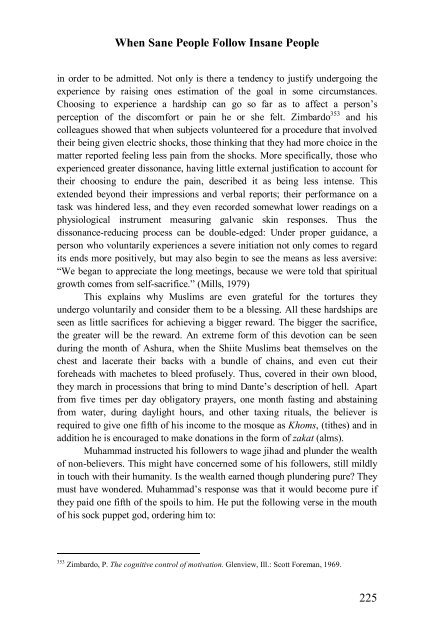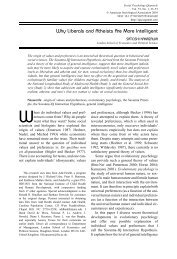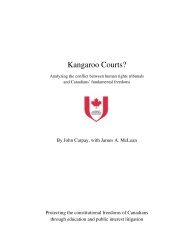Ali Sina - Understanding Muhammad
Ali Sina - Understanding Muhammad
Ali Sina - Understanding Muhammad
You also want an ePaper? Increase the reach of your titles
YUMPU automatically turns print PDFs into web optimized ePapers that Google loves.
When Sane People Follow Insane People<br />
in order to be admitted. Not only is there a tendency to justify undergoing the<br />
experience by raising ones estimation of the goal in some circumstances.<br />
Choosing to experience a hardship can go so far as to affect a person’s<br />
perception of the discomfort or pain he or she felt. Zimbardo 353 and his<br />
colleagues showed that when subjects volunteered for a procedure that involved<br />
their being given electric shocks, those thinking that they had more choice in the<br />
matter reported feeling less pain from the shocks. More specifically, those who<br />
experienced greater dissonance, having little external justification to account for<br />
their choosing to endure the pain, described it as being less intense. This<br />
extended beyond their impressions and verbal reports; their performance on a<br />
task was hindered less, and they even recorded somewhat lower readings on a<br />
physiological instrument measuring galvanic skin responses. Thus the<br />
dissonance-reducing process can be double-edged: Under proper guidance, a<br />
person who voluntarily experiences a severe initiation not only comes to regard<br />
its ends more positively, but may also begin to see the means as less aversive:<br />
“We began to appreciate the long meetings, because we were told that spiritual<br />
growth comes from self-sacrifice.” (Mills, 1979)<br />
This explains why Muslims are even grateful for the tortures they<br />
undergo voluntarily and consider them to be a blessing. All these hardships are<br />
seen as little sacrifices for achieving a bigger reward. The bigger the sacrifice,<br />
the greater will be the reward. An extreme form of this devotion can be seen<br />
during the month of Ashura, when the Shiite Muslims beat themselves on the<br />
chest and lacerate their backs with a bundle of chains, and even cut their<br />
foreheads with machetes to bleed profusely. Thus, covered in their own blood,<br />
they march in processions that bring to mind Dante’s description of hell. Apart<br />
from five times per day obligatory prayers, one month fasting and abstaining<br />
from water, during daylight hours, and other taxing rituals, the believer is<br />
required to give one fifth of his income to the mosque as Khoms, (tithes) and in<br />
addition he is encouraged to make donations in the form of zakat (alms).<br />
<strong>Muhammad</strong> instructed his followers to wage jihad and plunder the wealth<br />
of non-believers. This might have concerned some of his followers, still mildly<br />
in touch with their humanity. Is the wealth earned though plundering pure They<br />
must have wondered. <strong>Muhammad</strong>’s response was that it would become pure if<br />
they paid one fifth of the spoils to him. He put the following verse in the mouth<br />
of his sock puppet god, ordering him to:<br />
353 Zimbardo, P. The cognitive control of motivation. Glenview, Ill.: Scott Foreman, 1969.<br />
225






